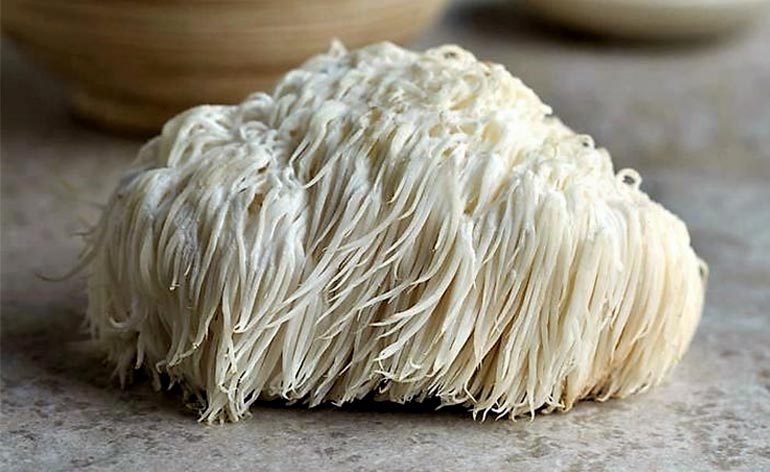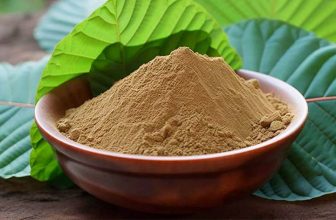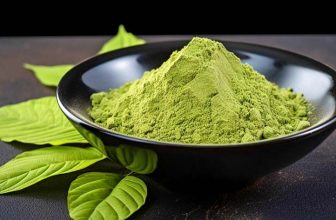
Lion’s mane mushroom, or the bearded hedgehog, is a medicinal, parasitic fungus found in North America, China, Japan and Europe. With the most common species being Hericium erinaceus, this mushroom comes under the ‘nootropic’ (i.e., smart drug and cognitive accelerator) group of foods having been used for millennia for its mind-enhancing, gastroprotective properties. Curious? Read on to discover our Top 5 Health Benefits of Lion’s Mane Mushroom!
1. Improves neurological health
Partly thanks to its content of the compounds erinacines and hericenones, lion’s mane increases Nerve Growth Factor (NGF) levels in your brain. This protein is involved in the maintenance of healthy brain cells and regeneration of old and damaged cells. Lion’s mane also aids in the restoration of nerve sheaths surrounding neurons and improves the conductivity of signals produced by nerves and neurons. It’s beneficial for the treatment of numerous nerve disorders, such as autism, Alzheimer’s, dementia, muscular dystrophy, multiple sclerosis and Parkinson’s, alongside its promising research results into its effects on obsessive-compulsive personality disorder, (OCD).
2. Boosts cognition
Also thanks to lion’s mane’s ability to increase NGF levels, it helps to promote the neuronal connection between the hemispheres of your brain. It can improve memory and lead to increased mental alertness, sharpness, focus and concentration. Personally, I’ve found that this mushroom significantly enhances my academic abilities, allowing me to better receive new information and usefully link it to related, existing knowledge that I already possess to great effect.
3. Overall rejuvenation
This fantastic fungus has valuable cardioprotective, hepatoprotective (liver protecting), neuroprotective, anti-diabetic, anti-inflammatory, anti-cancer and antibacterial properties. It is host to numerous phytochemcials such as iron, zinc, potassium, selenium, all primary amino acids, alongside various kinds of polysaccharides and polypeptides. Lion’s mane has a profoundly positive impact on the heart, liver, kidneys, stomach, spleen and contains powerful immune-strengthening polysaccharides, namely beta-glucans. It is valuable for improving digestion, very likely cancer prevention, and enhancing physical condition and restoring energy.
4. Improves mental well-being
Lion’s mane has the ability to improve mental disorders, uplift mood and increase mental clarity. This fungus’ ability to encourage neuroplasticity, which ultimately translates into new thought patterns, (helping transform acute or chronic habits caused by negative brain grooves) provides an effective method of ameliorating anxiety, depression, ADHD (Attention Deficit Hyperactivity Disorder) and addiction.
5. Gastroprotective properties
Studies have shown lion’s mane to have powerful gut healing abilities, with the capacity to prevent and reduce gastric ulcers thanks to its potent polysaccharide content. Its anti-inflammatory compounds have also shown to be effective in the treatment of gastritis and inflammatory bowel disease (IBS) and has been documented for its general wound-healing abilities. This medicinal mushroom has been used for centuries in China and Japan for the treatment of cancers of the stomach and oesophagus. It functions by restoring the mucous membrane in order to heal ulcers in the stomach and intestines.
If you think you’d enjoy gaining more mental engagement with your daily activities and improved gut health, or as legends of East Asia claim, “nerves of steel and the memory of a lion”, I’d strongly recommend trying out lion’s mane. With it no longer being served only to emperors and royalty, it can be purchased online from reputable, pure and organic sources, from various health food stores, or even grown at home with growing kits. Whole lion’s mane mushrooms can be sautéed and eaten on their own with various herbs and spices or added to other dishes. It has a familiar mushroom taste with a slight twist resembling seafood. As a powder, it can serve as a great addition to coffee, tea and smoothies or can be taken in capsule form. Tried Lion’s Mane, how was it for you? Let us know below or on Facebook and follow us on Twitter!










My son is bipolar and OCD; I want to try lion’s mane – feels like I’m running out of time. I don’t want him to give up or be unable to handle constructive criticism.